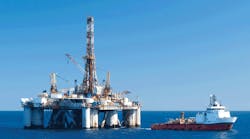Despite the environmental setbacks and the loss of human life experienced as a result of the Deepwater Horizon explosion and spill, deepwater drilling shows no signs of abating any time soon. However, increased regulatory scrutiny is likely to be the norm going forward.
While oil and gas companies are demonstrating the same zeal for deepwater drilling as before the Deepwater Horizon tragedy, they will need to further quantify the risks and this is good news for EHS managers seeking jobs in the industry.
A growing EHS presence within the oil and gas industry is leading to an increased need for risk and safety professionals. Specifically, greater supervision must occur in offshore oil and natural gas drilling sites in order to prevent environmental and safety incidents. In October 2011, the EU recognized that the likelihood of a major offshore accident in European waters remains unacceptably high and there has been a call to create effective emergency response plans for the oil and gas industry. In turn, the European Commission has proposed a new law which will ensure that European offshore oil and gas production will respect the world’s highest safety, health and environmental standards everywhere in the EU.
“Today, most oil and gas in Europe is produced offshore, often in harsh geographical and geological conditions,” said EU Energy Commissioner Günther Oettinger. “Given our growing energy demand, we will need all the oil and gas from beneath our seas. But we need to prevent accidents like Deepwater Horizon in the Gulf of Mexico from happening. Securing best industry practices in all our offshore operations is an undisputable must.”
Today, over 90 percent of oil and over 60 percent of gas produced in the EU and Norway comes from offshore operations, and there are more than 1,000 offshore oil or gas installations in operation in European waters. Because of this, job opportunities for EHS managers are multiplying in the North Sea region, where the majority of the oil coming from the U.K. and Norway is produced.
EHS Job Opportunities
This safety update is good news for the environment, but it’s also good news for the EHS and risk management job markets. Under the new rules, the European oil and gas industry would have to assess and further improve safety standards for offshore operations on a regular basis under the control of national regulatory authorities. According to Brussels, this approach would lead to a European risk assessment process that continuously is improved by taking into account new technology, know-how and risks; in turn creating an increase in job opportunities for risk and safety professionals in the industry.
“There is a demand for risk and safety consultants within the oil and gas industry,” said Stuart Kingsnorth, a senior risk and safety consultant at Allen & York. “In particular, this role requires an individual who is able to work in a commercially-focused environment, delivering technically complex work on time and on budget to a range of clients.”
The technical skills that are of particular demand in the area of risk mitigation are hazardous operability and study, hazard analysis and hazard identification and are requirements for candidates seeking a new role within risk and safety. The demand for EHS professionals is great, said Kingsnorth, who noted that a severe skills gap, driven when the IT boom hit in the 1990s, is driving students away from engineering. In turn, experienced EHS managers are leaving their employers and going out on their own to act as a consultant for oil and gas companies that are hard hit by the lack of EHS professionals.
There are a growing number of opportunities within the oil and gas industry for candidates who do not have industry experience. Although there is a genuine need for the EHS skillset, there still is a slight stubbornness within the industry to accept that EHS professionals from other industries can diversify into the oil and gas industry and transfer their skills. Particular industry sectors where skilled EHS professionals could transfer into the oil and gas industry are the automotive industry, as it has very high quality standards, and the shipping industry, as the offshore and subsea engineering skills are adaptable into oil and gas projects.
Vicky Kendrick is with Allen & York, an international sustainability recruiter that specializes in placing health, safety risk, engineering and environmental professionals across a number of industries.